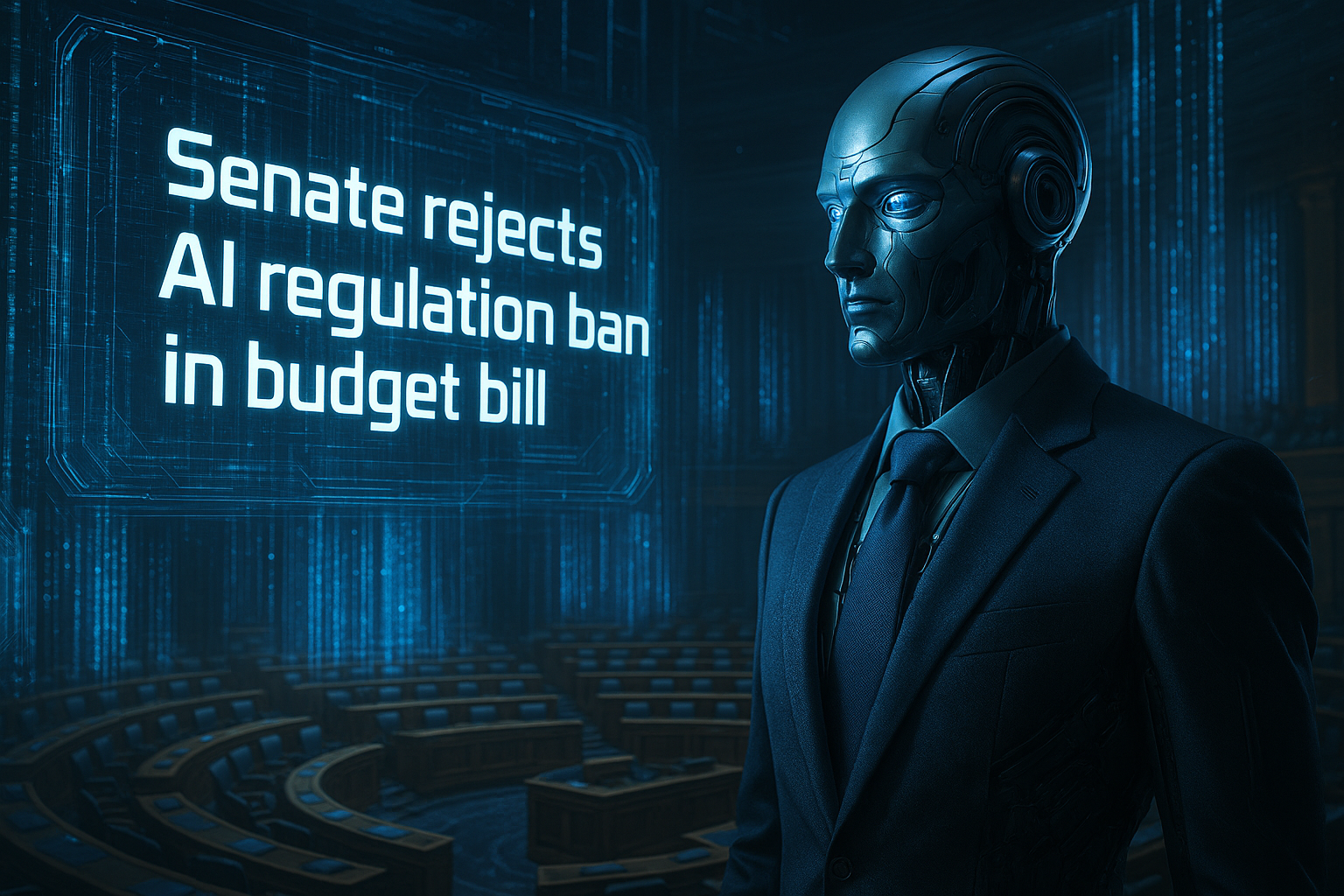
US Senate removes controversial ‘AI moratorium’ from budget bill
# The Senate’s Strong Stand Against AI Regulation Ban: A Lesson in Bipartisanship and Accountability
In the complex and ever-evolving world of artificial intelligence (AI), it’s crucial that regulation keeps pace with innovation. A recent decision made by the U.S. Senate serves as a compelling example of how bipartisan cooperation can override industry pressure and ensure that regulatory frameworks serve public interest over corporate interests. The Senate’s overwhelming vote to remove a ten-year ban on state regulation of AI showcases the power of unity and accountability when faced with pivotal issues in technology policy.
## A Controversial Provision
The initial proposal, backed by significant Silicon Valley players like OpenAI’s Sam Altman and Anduril’s Palmer Luckey, sought to implement a 10-year moratorium on states’ abilities to regulate AI. These supporters viewed the moratorium as a necessary measure to avoid a “patchwork of regulation” that could, as they feared, inhibit AI innovation.
Introduced by Senator Ted Cruz (R-TX), the provision was part of the broader legislative package referred to as the “Big Beautiful Bill.” The proposal was designed to standardize AI regulations federally, ostensibly to prevent inconsistencies that might arise from state-specific laws. However, the provision was seen by many as a move that could potentially leave AI companies operating with minimal oversight and accountability.
“This was more than just a fight over state vs. federal power; it was about balancing industry innovation with ethical accountability and consumer protection.”
## Bipartisan Pushback
The proposal did not go unchallenged. It garnered substantial opposition from both sides of the political aisle. Critics argued that the ban on state regulation would effectively let powerful AI companies operate unchecked, potentially putting consumers at risk. For them, the provision represented an alarming lack of oversight, with the potential to harm rather than help innovation in the long term.
Senators from both parties voiced concerns about the provision:
– **Democrats** argued that allowing states to experiment with their own regulations could lead to more effective and responsible AI governance.
– **Republicans** joined the opposition, worrying that the ban signaled a dangerous precedent of relinquishing state autonomy over critical technological advancements.
## A Defining Amendment
Initially, Sen. Marsha Blackburn (R-TN) was against the moratorium but attempted to negotiate with Cruz to reduce the ban’s timeframe from ten years to five. Despite this compromise, Blackburn withdrew her support entirely, highlighting the measure’s fundamental flaws.
Taking decisive action, Senators Blackburn and Maria Cantwell (D-WA) offered an amendment to strip the moratorium from the broader legislation. Their collaboration underscores a vital bipartisan agreement on the importance of maintaining states’ rights to regulate industries as rapidly changing as AI.
## What We Can Learn: The Importance of Balance
The Senate vote, with a dramatic 99-1 turnout, effectively removed the AI regulation ban. This resounding decision highlights several critical takeaways:
### 1. **Checks and Balances Are Vital**
Allowing individual states to regulate AI ensures that there is more than one entity overseeing AI policy and ethics. This can potentially lead to more innovative and tailored solutions to fit specific state needs and contexts.
### 2. **Bipartisan Cooperation is Key**
Even in a divided political landscape, there’s room for bipartisan cooperation when the rights and safety of the public are at stake. The coalition between Senators Blackburn and Cantwell serves as a reminder of what can be accomplished when officials prioritize constituents over industry pressures.
### 3. **The Need for Nuanced Regulation**
The AI industry is evolving rapidly, and a one-size-fits-all approach may not be conducive to fostering innovation responsibly. Flexibility in regulation allows for adaptation as technologies evolve, reinforcing the importance of thoughtful, considerate policy-making.
## Asking the Bigger Questions
This situation poses essential questions that extend beyond AI or this particular vote. How do we ensure technology serves the public good without being constrained by undue regulation, and who gets to make those decisions? By evaluating the balance between federal and state powers, we delve into broader implications for democratic processes in tech policy — how do we decide who gets to draw the line in the digital sand?
As we stand at the forefront of technological advancement, the decisions made today about AI regulation will have profound implications on the future. The Senate’s decision casts a long shadow, prompting further reflection on how we govern technology that shapes society at its core. In this light, the question remains: how can we remain vigilant and proactive, ensuring innovation does not outpace our ethical and legal frameworks?
Ultimately, it’s essential to keep the dialogue ongoing, engage deeply with both the challenges and opportunities AI presents, and work collaboratively across party lines to craft laws that best serve society as a whole.

